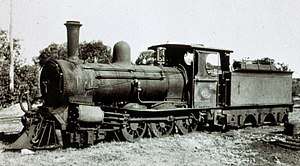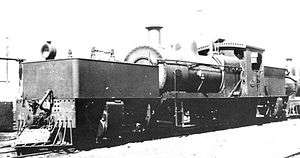WAGR A class
The WAGR A class was a class of 2-6-0 steam locomotives designed by Beyer, Peacock & Co and operated by the Western Australian Government Railways (WAGR) between 1881 and 1955.
| WAGR A class | |||||||||||||||||||||
|---|---|---|---|---|---|---|---|---|---|---|---|---|---|---|---|---|---|---|---|---|---|
 A11 at Midland Junction in 1943 | |||||||||||||||||||||
| |||||||||||||||||||||
| |||||||||||||||||||||
| |||||||||||||||||||||
| |||||||||||||||||||||
History
The first A class engine was ordered from Beyer, Peacock & Co, Manchester by John Robb, the contractor building the first section of the Eastern Railway between Fremantle and Guildford.[1] It arrived in Western Australia in 1880 and was similar in design to the South Australian Railways W class.[2]
The WAGR acquired this locomotive upon completion of the construction contract in 1881 and numbered it 3 Other locomotives of the same design, were later purchased both new and second hand. When engine class designations were introduced in 1885, the locomotives became the A class.[3] When engine class designations were introduced in 1885, this whole group of engines became the A class. All but one of the 13 A class engines was built by Beyer, Peacock & Co; the other was built by Dübs & Co. Three had six-wheel tenders as opposed to four-wheel varieties.[1]
The A class was used initially for main line passenger services, and later on branch lines. Some were sold to timber mills. The last was withdrawn in 1955, and two examples were preserved.[4] A11 was placed on display at the Perth Zoo and is now with the Western Australian Rail Transport Museum, while A15 was plinthed in Bunbury and is currently under restoration in Meredith, Victoria.[2][5][6]
Namesake
The A class designation was reused in the 1960s when the A class diesel locomotives entered service.
See also
- History of rail transport in Western Australia
- List of Western Australian locomotive classes
References
Notes
- Gunzburg 1984, p. 19.
- Whiteford, David; De Bruin, Charles; Watson, Lindsay; Watson, Neville (1983). Western Australian Preserved Locomotives. Elizabeth: Railmac Publications. p. 11. ISBN 0 949817 19 8.
- Minchin, RS; Higham, GJ (1981). Robb's Railway Fremantle to Guildford Railway Centenary. Bassendean: Australian Railway Historical Society. p. 10. ISBN 0 9599690 2 0.
- Gunzburg 1984, pp. 19 and 21.
- A11 Australian Steam
- A15 Australian Steam
Cited works
- Gunzburg, Adrian (1984). A History of WAGR Steam Locomotives. Perth: Australian Railway Historical Society (Western Australian Division). ISBN 0959969039.
External links
![]()

